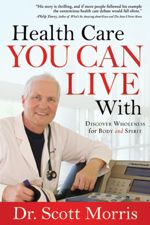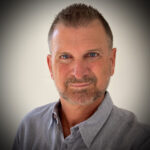
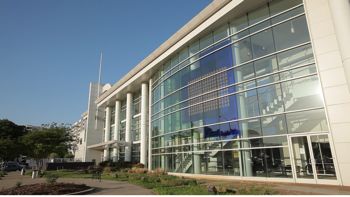 Dr. Morris’ book 40 DAYS TO HEALTY LIVING releases in July 2011. After you read this article I encourage you to consider the role Christians can have in brining better wellness and fitness to your community. Let God challenge you to take action. I also encourage you to take a group and attend one of the Church Health Center’s Replication Workshops. -Brad Bloom, Publisher, Faith & Fitness Magazine
Dr. Morris’ book 40 DAYS TO HEALTY LIVING releases in July 2011. After you read this article I encourage you to consider the role Christians can have in brining better wellness and fitness to your community. Let God challenge you to take action. I also encourage you to take a group and attend one of the Church Health Center’s Replication Workshops. -Brad Bloom, Publisher, Faith & Fitness MagazineIf a church has to offer fried chicken to draw a crowd, then something is wrong with the message. We might think that when the culture fails us with its messages that work against wellness, we can at least turn to the church. After all, the church connects us to God. The church is where we go when we are looking for more of God, our creator, who made us body-and- spirit. Unfortunately, the church carries false messages of its own that pull us away from health, rather than toward it.
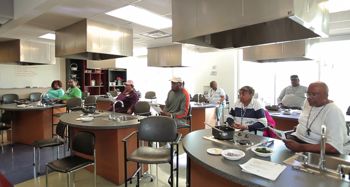 CHURCH FILLS YOU UP
CHURCH FILLS YOU UP
The filling station mentality is an endless problem. People go to church expecting to get filled up and tuned up for another week. They run their motors down during the week and go back for another filling.
That’s not how life works, and church should not function that way. The church is there to help you figure out how to charge your battery every day of the week. Being a disciple of Jesus and experiencing God’s presence in the here-and-now doesn’t happen simply on Sundays. Expect the church to give you tools you can use all week, but the real experience of knowing God more deeply should happen Monday to Saturday as well as on Sunday. Too many churches foster a dependence on pastors and other paid staff to impart spiritual wisdom, rather than helping people to dig deeper with God in their real-life experience. The church ought to be helping people approach God without thinking they must have the help of a religious professional in order to do so. God fills you up, not the church, and God is open for business twenty-four hours a day. That simple shift in thinking can change your experience of God, which then touches every part of your life.
 CHANGE HAPPENS IN AN INSTANT
CHANGE HAPPENS IN AN INSTANT
Dramatic religious experiences are powerful. Conversion experiences, in particular, sometimes genuinely produce rapid change. The new believer puts the old ways behind and embraces new life in Christ. It’s not always that way, though. Conversion often happens over a period of time. A deepening faith certainly happens over a period of time. We do people a disservice if we lead them to believe that a powerful experience changes everything in an instant. They wake up the morning after a retreat, and life is still there with all its mess and complications. We do not present a true understanding of the fullness of life when we set an expectation that everything will be sweetness and light in Jesus. If you have a powerful spiritual experience, embrace it. Savor it. Then let it change you and make you more whole over time.
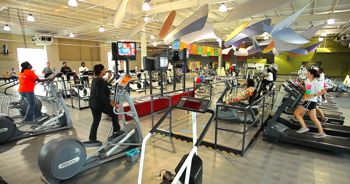 EVERYBODY KNOWS THE BIBLE
EVERYBODY KNOWS THE BIBLE
We make assumptions right and left at church about what people know about religion. Often these assumptions are dead wrong. We cannot assume that people read the Bible, or even that they own a Bible. They may not know the Bible stories church people refer to in casual conversation or sermons. For some people, just saying the word “Elijah” conjures up images of a massive fiery religious contest between the ancient Hebrews and the worshipers of Baal on top of Mount Carmel. But many others are quietly thinking, Elijah who? We bring about shame and guilt for people with our assumptions about what they should know. How can the church point people to wholeness they can find in God with that starting point? We would be a far more effective force of true change if we meet people where they are and lead them gently along the path of welcoming God into every part of their lives.
 BEING BUSY MAKES YOU MORE RIGHTEOUS
BEING BUSY MAKES YOU MORE RIGHTEOUS
Despite theoretically advocating balance and priorities, the church does an incredible job of keeping people busy. We manage to make it sound like God’s calling. How can you say no to a Bible study? How can you not serve on the committee when you are so gifted for the work? The sign-up list for the outreach team is in the foyer. God wants you to do this.
Life is a marathon, not a sprint. Churches burn out too many people with a sprint mentality. The rewards of a full and healthy life come from being able to sustain your efforts, even in your service to God.
We use volunteer physicians at the Church Health Center, in addition to our paid staff doctors. Also, specialists who want to support our work agree to see patients we refer for free or low-cost care. But we purposely schedule volunteer doctors for only one shift every two or three months, and specialists for only two or three patients a month. At this pace, we have numerous doctors who stay with us for many, many years. We’re asking them to run a well-paced marathon with us, not expend themselves with back-to-back sprints.
When churches keep people overly busy, they create time constraints that do not encourage exercise, relationships, reflection, nutritious meals, and other elements of a healthy lifestyle to sustain the whole person, not just the religious life. Pastors are often the most unhealthy people in the church because of the expectations they have for themselves and the expectations their congregations have for them. Being busy does not make you closer to God.
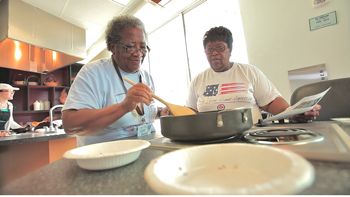 FELLOWSHIP TRUMPS HEALTHY EATING
FELLOWSHIP TRUMPS HEALTHY EATING
Often the least healthy meal we eat is at church. It’s as if it’s okay to eat all the chocolate cake you want because you’re having fellowship over a meal. We create the idea of church as a cocoon from life. Somehow it’s okay to set aside what we know about nutrition for the church potluck. It’s acceptable to encourage indulgence in foods we don’t eat otherwise because we’re eating at church. I’m all for fellowship and the relationships that emerge from the church community, but church is not an escape from life. It ought to be what real life is. If a church has to offer fried chicken to draw a crowd, then something is wrong with the message.
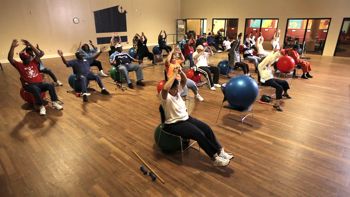 EIGHT WEEKS IS LONG ENOUGH
EIGHT WEEKS IS LONG ENOUGH
Churches are great at starting things, and terrible at sustaining them. A visionary burst gets the ball rolling with some new ministry, and a few weeks of organizational flurry follow. Far too often, though, after six or eight weeks, the effort dies out. Leadership transitions. Participation dwindles. Meetings get canceled. People are on to the next new project.
Ted Turner, creator of the Cable News Network (CNN) pioneered new frontier with 24-hour news. Many doubted the effort was sustainable and asked how long he planned to stay on the air. He answered that he intended to stay on the air until the world ended. Then he would play “Nearer, my God, to Thee” and sign off.
Church programs and ministries don’t have to last until the Second Coming of Christ. But it’s harmful to launch new efforts we are not prepared to sustain. Ministries need a beginning, a middle, and an end, not a launch complete with fanfare and then a quiet disappearing act. In our work serving the poor at the Church Health Center, we’ve learned that it’s better never to start something than to raise expectations and not follow through. Hope is a key component of wellness, and when we raise hope only to deliver disappointment, we are not helping people be more healthy.
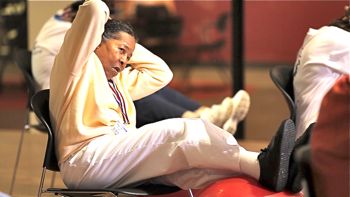 WE DON’T TALK ABOUT THAT
WE DON’T TALK ABOUT THAT
Churches are filled with people who have aging parents, and they’re struggling to know how to care for them. Some of these parents have significant physical challenges or diseases like Alzheimer’s. Others in the church duly ask, “How’s your mother?” to which many people lie, “Mama’s doing fine.” The questioner may never get around to inquiring how the caregiver is doing. This goes on until Mama dies. At the funeral everybody says what a wonderful woman she was and what a great son or daughter you were. Then people tend to think they shouldn’t talk about the loss, and it’s as if the parent never lived. The truth is, people who suffer this kind of personal loss want to talk about Mama. But we don’t.
We could say the same thing about teen sexuality—or sexuality issues in general—or addictions, abuse, rebellious children, marital stresses, estranged siblings. We don’t talk about those topics. Yet they are the messy stuff of life that happens even to Christians. How can we remind someone God is present in those situations when we don’t want to be present in them ourselves? Churches have powerful opportunities to be places of healing if members would learn to talk lovingly about the experiences that assault the health of the whole person. Most churches don’t do a good job of helping people wrestle through the tough challenges and reflect on how the experience impacts overall wellness.
You can’t believe everything you hear in the culture on the subject of health, and churches don’t always get it right, either. The pursuit of health sometimes feels like an uphill trek. But you are still the expert on you. It’s your journey to wellness. Understanding messages gone awry can help you keep your eye on the goal of wellness rather than getting sidetracked by things you don’t really believe. While you can’t change everyone around you, you can make your personal choice to pursue health in your own life and to express wellness to others in your life.
